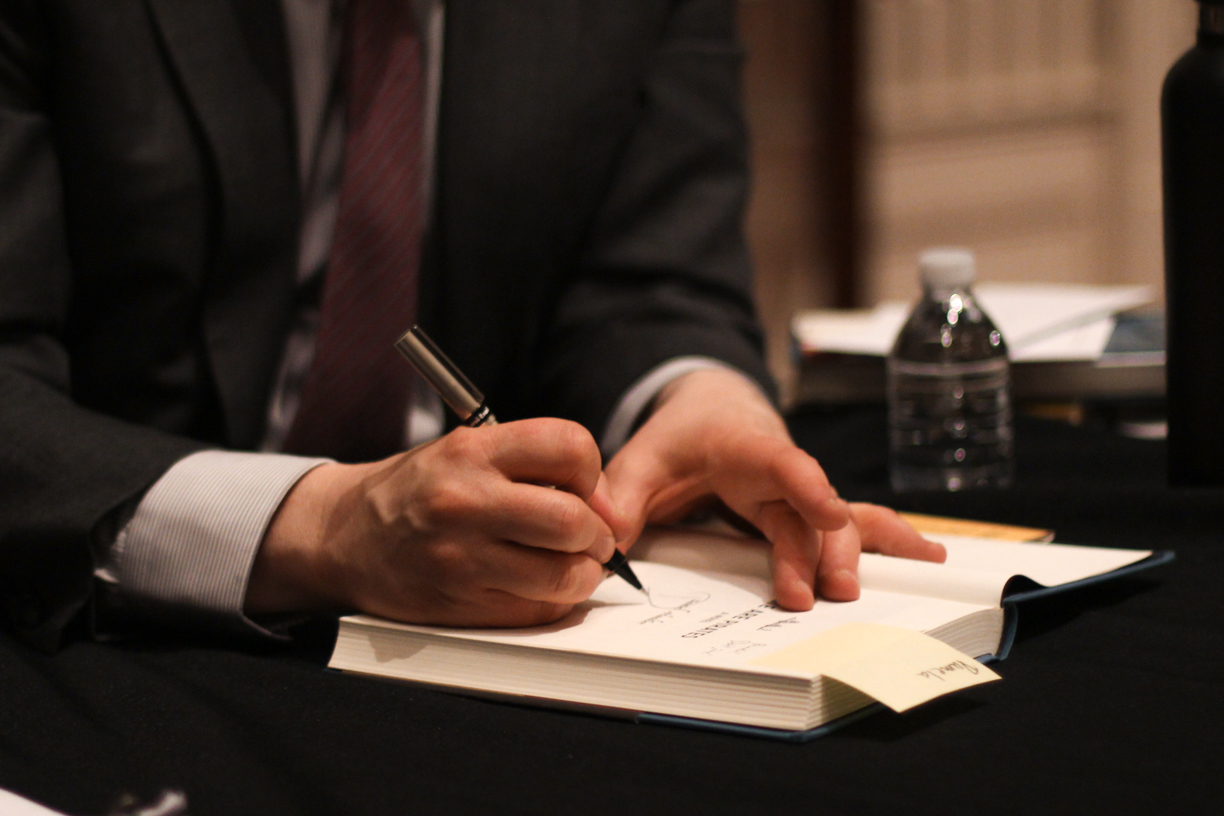
News
Pro-Palestine Encampment Represents First Major Test for Harvard President Alan Garber

News
Israeli PM Benjamin Netanyahu Condemns Antisemitism at U.S. Colleges Amid Encampment at Harvard

News
‘A Joke’: Nikole Hannah-Jones Says Harvard Should Spend More on Legacy of Slavery Initiative

News
Massachusetts ACLU Demands Harvard Reinstate PSC in Letter

News
LIVE UPDATES: Pro-Palestine Protesters Begin Encampment in Harvard Yard
'Lemony Snicket' talks 'We are Pirates'
A Reading and Interview of Daniel Handler
Daniel Handler chuckles as he gestures to the iPhone recording his voice. “It’s interesting that we’re recording the interview on a smartphone,” he says. Handler, who wrote the children’s series “All The Wrong Questions” and the ever-popular “A Series of Unfortunate Events” under the pseudonym of Lemony Snicket, is talking about feelings of claustrophobia associated with contemporary technology. He sits wearing a suit and tie in the anteroom of the First Parish Church in Cambridge, shortly before his Feb. 20 Harvard Book Store discussion of his new adult novel “We Are Pirates.”
The presence of the blinking iPhone brings Handler’s novel to mind. For Gwen Needle, the 14-year-old protagonist of “We Are Pirates,” contemporary connectivity’s frustrating role in limiting adolescent freedom makes the pirate’s life appealing. Handler reveals that Gwen’s anguish is inspired by real conversations he had at the dawn of the iPhone age. “I was meeting all of these teenagers because of the Snicket books who had all been given smartphones,” he says. “I’d say, ‘Oh, you must love that because certainly all of the media I see is about the kids digging their new smartphones. A girl said to me, ‘I can never call my parents and be somewhere other than where I say I am,’” Handler recounts.
The disparity between Handler’s own adolescence, which he says was entirely based on lying to his parents, and those of today’s online youths made Handler want to explore teenage escape. Although Gwen’s parents play a large role in the book, Handler focused almost exclusively on his younger character in his interview and reading. During the reading, Handler presented a scene in which Gwen, after stealing from a drug store, becomes a “buddy” for dementia patient Errol. As the two lost souls began to bond over pirate literature, Handler flipped forward in the book to a scene in which Gwen and Errol have already taken to the high seas (San Francisco Bay) to find treasure. The audience laughed heartily at Handler’s rendition of the pirates’ pathetic theft of a yacht.
While Handler is quick to critique cell phones—he doesn’t own one—he treads more lightly on the subject of gentrification in San Francisco. The book references absurd housing prices, but Handler isn’t convinced that his book’s setting, which is also his own lifelong home, is losing its culture. “San Francisco is always in flux,” he says. “Everything is changing and nothing is changing.” He imbues his text with a dual vision of 19th century Barbary Coast San Francisco as well as its current tech-infused incarnation. “I hope it realizes both aspects of the city—that you can go to a neighborhood that will look exactly the same from 1954 and then go to a neighborhood that is completely transformed as of two weeks ago,” he says.
As in “A Series of Unfortunate Events,” Handler employs a nameless narrator in “We Are Pirates.” While it is clear that the chronicler has met the Needle family, the voice also admits to inventing plot elements and takes issue with Gwen’s father’s occasional lack of political correctness. While Handler is known for mysterious and complex narrative schemes, his decision to go for ambiguity in “We Are Pirates” came from within the pirate genre. “I was reading a lot of 19th century literature—you know, a lot of the classic swashbuckling literature—and a lot of them use a narrator to get into the story,” he says. Taking on a hardened British accent, he imitates one of these framing figures: “I was walking down the street and I found this manuscript…here it is!”
At the reading, Handler was only sometimes the center of attention. As part of his ongoing championing of poetry, he decided to co-host the event with Boston poets Janaka Stucky, the founder of the Black Ocean press, and Elisa Gabbert. After giving a brief humorous introduction about the Northeast’s particularly brutal February, Handler deferred to the poets and sat, laughing and nodding, while they presented their work. Stucky delivered a love meditation around the phrase “Thus I perish in amazement” while Gabbert shared part of a manuscript inspired by the 1996 Wallace Shawn play “The Designated Mourner.”
The goodwill and literary experimentation in First Parish on Friday suggests that Handler, who has been under scrutiny since his controversial comments at the National Book Awards in November, is anything but jaded. “I didn’t know how this tour was going to go, between the weather and the profile of the book,” Handler says. “So my thinking was: If a lot of people come, then a lot of people get to hear these great poets. And if nobody comes, instead of feeling like a failure by myself I can go and get drunk with the other poets.”
—Staff writer David J. Kurlander can be reached at david.kurlander@thecrimson.com.
Want to keep up with breaking news? Subscribe to our email newsletter.



